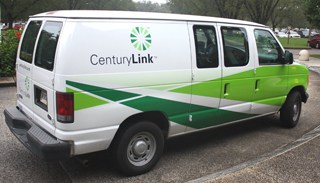 Invest or die. That succinctly explains the current state of the landline telephone business and the companies providing service to a decreasing number of Americans. Some companies, like AT&T and Verizon have heavily diversified their business into wireless, fiber, IPTV and broadband. Others, like Frontier are hoping their presence in uncompetitive rural markets will keep them in business, as long as their dividends keep stockholders happy.
Invest or die. That succinctly explains the current state of the landline telephone business and the companies providing service to a decreasing number of Americans. Some companies, like AT&T and Verizon have heavily diversified their business into wireless, fiber, IPTV and broadband. Others, like Frontier are hoping their presence in uncompetitive rural markets will keep them in business, as long as their dividends keep stockholders happy.
CenturyLink, which is in the process of absorbing the last remaining Baby Bell — Qwest, has decided to invest in their business to stay competitive with their biggest nemesis — the cable company. CenturyLink is still hanging on to ADSL broadband service in many rural areas, but the company sees the promise of future relevance with bonded DSL, which is delivering 25/2Mbps broadband service to an increasing number of their customers. Where distances allow, CenturyLink is at least temporarily providing the fastest residential broadband service available in areas like southwest Florida. They are holding their own against local cable competitors like Comcast.
Now the company is following AT&T in introducing a new IPTV service to many of its customers. Dubbed Prism, the U-verse like service delivers a true triple play package to customers who thought they would be stuck with their local cable company or satellite dish provider for TV programming.
Prism offers more than 200 channels, a multi-room DVR capable of recording up to four shows at the same time, and an interactive program guide that doesn’t need an instruction manual to navigate.
[flv width=”640″ height=”390″]http://www.phillipdampier.com/video/Introducing CenturyLink Prism.flv[/flv]
This promotional video introduces CenturyLink’s Prism service and its television features. (4 minutes)
 Prism has been introduced in larger CenturyLink areas ranging from southern Nevada, southwestern Florida, and North Carolina, where EMBARQ used to provide telephone service.
Prism has been introduced in larger CenturyLink areas ranging from southern Nevada, southwestern Florida, and North Carolina, where EMBARQ used to provide telephone service.
The service works through a hybrid fiber-copper wire IPTV network. Fiber optic cable reduces the distance data needs to travel over ordinary copper phone wires. The less copper, the faster the potential speed. With a 25-30Mbps broadband platform, Prism can divide up available bandwidth to support television, phone, and up to 10Mbps broadband service. It’s all delivered over the same digital network. While not as advanced as Verizon FiOS and other fiber to the home networks, IPTV services like Prism and U-verse are cheaper to provide, and that can mean faster deployment in areas not well served by competition.
Reaction to Prism has been generally positive among Stop the Cap! readers who have shared their stories with us. Among the positives:
- The interactive program guide is light years ahead of Comcast, Cox, and Time Warner Cable;
- Broadband speeds are generally better than the original DSL service CenturyLink used to provide;
- The picture quality is excellent where the telephone network has been upgraded the most;
- Competitive introductory and retention offers mean consumers can pay less for service, at least initially.
But there are some problems, too:
- Bandwidth varies depending on how far away you are from the nearest fiber node. This affects what you can do with the service. If you are further out, you can only watch one HD television channel at a time, and may not be able to record more than one HD channel at the same time;
- The DVR box has issues — readers report shows disappear, don’t get recorded, or show poor results when line quality drops;
- Broadband speeds with Prism officially max out at 10Mbps;
- If you are watching a number of televisions at the same time, your broadband speeds could drop;
- Variability in service quality comes largely as a result of inferior copper wire phone networks CenturyLink chose to stick with. If your phone line is prone to static or hum, or deliver poor results when the weather is bad, Prism might not work well for you.
 Some subscribers found they initially loved the service, but when bad weather arrived, it all fell apart.
Some subscribers found they initially loved the service, but when bad weather arrived, it all fell apart.
“Our phone lines are decades old, so this comes as no surprise,” says Manny who writes from Naples, Fla. “I was also disappointed some of the channels in HD I had with Comcast are not available from Prism.”
In parts of Raleigh, N.C., Prism just launched a few weeks ago. But some of our readers are sticking with Time Warner Cable.
“After looking over their pricing and packages, Time Warner has more HD channels and doesn’t charge $12 a month extra for them,” writes Ralph. “CenturyLink also only bundles 3Mbps broadband service with most of their packages, and you have to pay extra for 10Mbps service.”
Ralph thinks Road Runner from the cable company will provide a more consistent broadband experience for his family.
“There is only so much you can push through a phone line at the same time; I like the fact they are competing, but they will not be able to keep up if they rely on copper phone wiring forever,” Ralph says.

Cox faces new competition in southern Nevada
Despite some of the negatives, CenturyLink may deliver formidable competition where cable companies haven’t kept up. Some other markets where Prism will offer service: Jefferson City, and Columbia, Mo., and La Crosse, Wis. Cox Cable in southern Nevada is now competing with Prism, and believes it has the superior network.
“The way our system is constructed, we have services equally distributed everywhere in the valley,” Juergen Barbusca, Cox manager of communications, public and government affairs in Las Vegas said. “Everybody in our footprint can get our highest advertised speeds.”
Cable broadband is less susceptible to distance degradation that can make Prism a no-go in neighborhoods at the far end of a phone company’s central office.
Also equally distributed is the price. Outside of new customer promotions, nobody will save any money here. Cox and CenturyLink are both selling their respective triple-play packages of TV, Internet, and phone for exactly the same price: $143 a month.
[flv width=”480″ height=”380″]http://www.phillipdampier.com/video/KTNV Las Vegas CenturyLink Prism 2-8-11 WFTX Cape Coral CenturyLink in SW Florida 12-7-10.flv[/flv]
KTNV-TV in Las Vegas introduces viewers to CenturyLink’s Prism service and WFTX-TV in Cape Coral, Florida talks with CenturyLink about their new 25Mbps broadband service in two exceptionally company-friendly pieces from the stations’ respective news shows. (13 minutes)



 Subscribe
Subscribe





